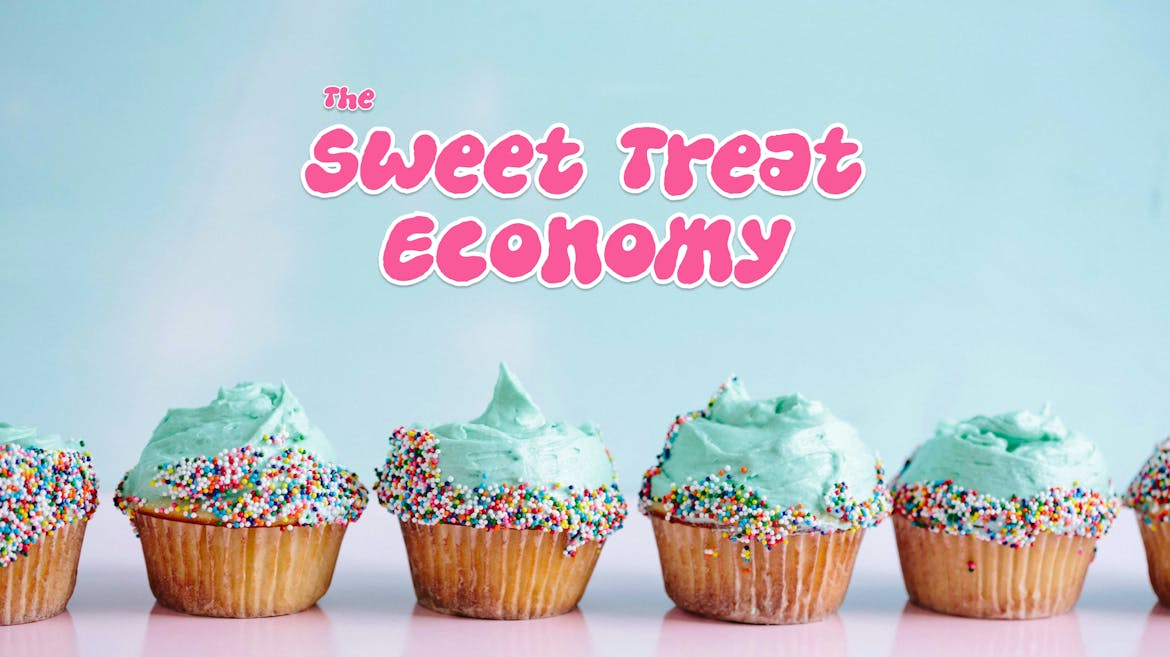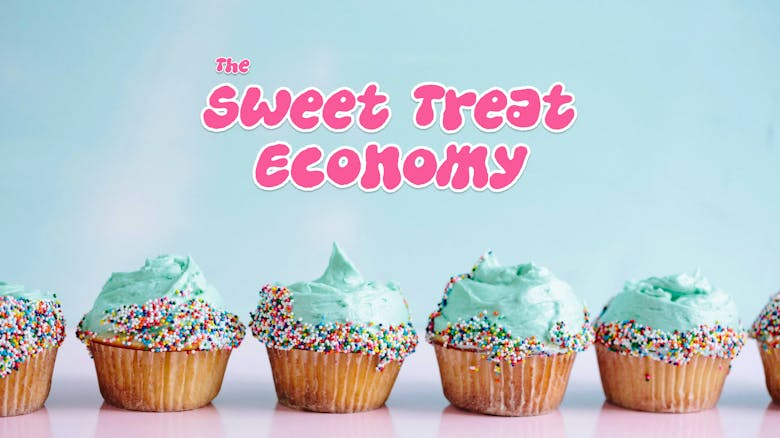
The "Sweet Treat Economy": Why little luxuries are thriving in hard times
Katie DochertyIn the face of economic uncertainty, consumers are finding reassurance in small indulgences, leading to the emergence of the “sweet treat economy”. As financial constraints shape habits, more individuals are looking out for emotional comforts without significant financial commitment. This shift highlights an important trend for brands and agencies looking to engage consumers in meaningful ways.
The lipstick effect
As consumers find themselves more constrained financially, they often turn towards small comforts, those affordable luxuries. This behaviour is encapsulated by the “Lipstick Effect” a term coined by Leonard Lauder, the chairman of Estee Lauder, in 2001. Lauder observed that lipstick sales tended to rise during economic downturn, particularly following the 9/11 attacks. The Lipstick Effect suggests that during tough times, consumers gravitate towards small indulgences—like lipsticks—as mood-boosters when larger purchases feel unjustifiable. Research supports this phenomenon, indicating that people often seek ‘feel-good’ purchases during periods of economic stress or uncertainty.
Today’s environment mirrors this behaviour. Amid inflation, political shifts and global unrest, people are often unwilling – or unable – to spend on big-ticket items, prompting a desire to be more frugal whilst still treating yourself. This results in consumers buying smaller, more affordable luxuries or “sweet treats” which act as a psychological coping mechanism. It is easier to justify buying a premium Fenty lip gloss or an iced matcha latte instead of big-ticket items - it’s a budget friendly form of escapism, especially after the last five years since the pandemic. Artisanal bakeries, specialty coffee chains, and independent cafes have all experienced notable growth in response to this trend.
Small pleasures, big impact
After several months of muted private spending in the UK, recent data indicates a consumer-led recovery, especially in sectors like grocery, health and beauty. While government spending has been the primary economic driver in the last year, factors such as improved consumer confidence and a slight drop in interest rates are contributing to this resurgence too.
For instance, grocery spending saw its highest surge since March, thanks to summertime picnics and BBQs, while other sectors like confectionary, cosmetics and health items are seeing renewed interest as consumers prioritise health-conscious habits and affordable luxuries. Sweet treats, like baked goods, are the most popular type of pick-me-up that these joy-seekers prioritise, with 45% of consumers citing them as their go to indulgence.
Supermarkets report increases in sales of raw and whole-food items, indicating a shift towards healthier choices. This trend has encouraged brands to double down on their “health-centric” messaging and packaging. Meanwhile, pharmacies and health & beauty retailers experienced a 7.3% sales increase in 2024, contrasting with a 1.7% drop for clothing retailers. This suggests that even as consumers navigate financial cutbacks, they are still finding room for "affordable luxuries” prioritising cosmetic products. In fact, around 47% of consumers continue to spend on these small indulgences that bring them joy, while 53% state they are planning to spend less on clothing, thus striking a balance between financial caution with moments of self-care.
What are marketers doing about this?
For brands and agencies, these trends reveal deeper emotional responses from consumers seeking comfort and a sense of control. Iconic fashion brands have recognised this shift and are responding – for example by offering high-end food experiences, allowing consumers to enjoy a taste of luxury without the hefty price tag of designer handbags.
One example is Prada Caffè, where the fashion house serves breakfast, lunch, dinner, and small bites within its signature luxurious interior. Similarly, Louis Vuitton has entered this space with its own café, led by renowned chef Maxime Frédéric, showcasing how high-end brands are tapping into the culture of small rewards. By aligning with this “treat yourself” sentiment and positioning these offerings as both affordable and luxurious, brands can effectively engage consumer interest in the "sweet treat economy."
Brands that successfully capture this culture of “small rewards” and dopamine-boosting experiences are thriving. They provide consumers with a bit of indulgence—a moment of luxury or wellness—even amid economic uncertainty. Whether it’s a premium coffee, a skincare mini, or a small yet meaningful experience, these products provide a budget-friendly, feel-good win.
For agencies, the “sweet treat economy” offers a unique opportunity to guide brands towards strategies that resonate with consumers’ emotional want for comfort, control, and self-care. By tapping into the drive of small indulgences, agencies can help brands establish themselves as trusted sources of everyday luxuries. It is a unique opportunity to guide brands in leveraging the “sweet treat economy”, helping them connect with consumers’ desire for affordable indulgence and emotional comfort. Agencies might start advising pop-up events and immersive in-store experiences, focused on small wins or comforting micro-luxuries, allowing brands to deliver emotional value that consumers crave in challenging times. In a market where large purchases are being sidelined, brands that consistently offer accessible comforts and memorable experiences will remain relevant and valued by consumers.
If your agency is looking to partner with brands in this space, we can help. With two decades of experience connecting agencies and brands, we’re ready to support your growth. Get in touch with Emma Robson to explore how we can work together.
Subscribe to Ingenuity’s content hub
Receive the latest interviews, insights and trends straight to your mailbox.

